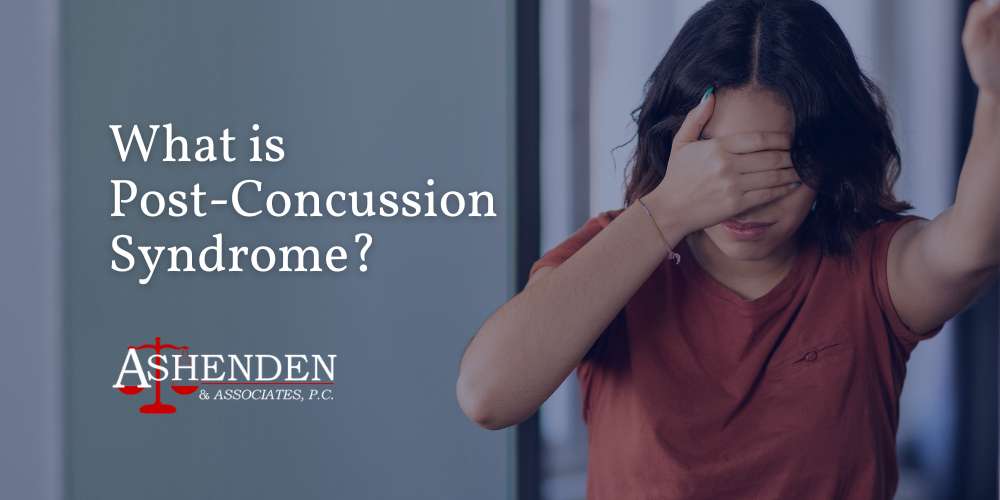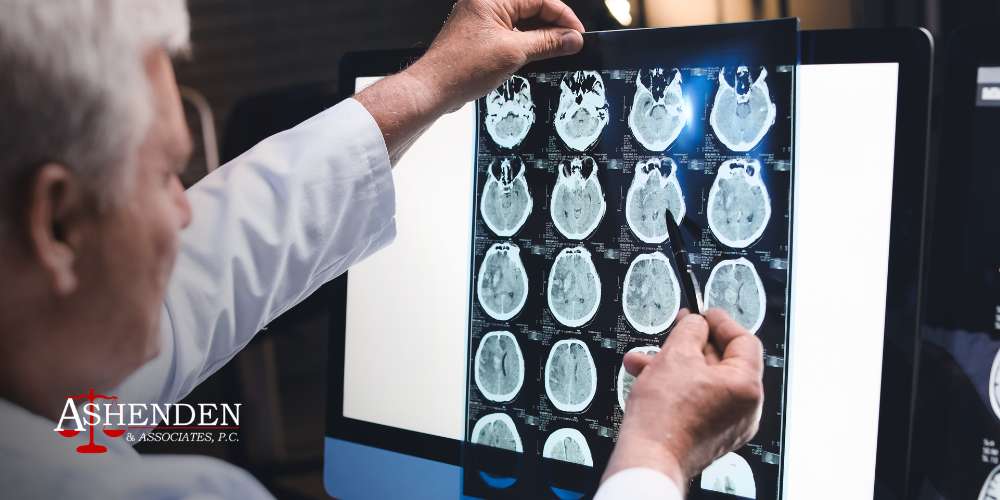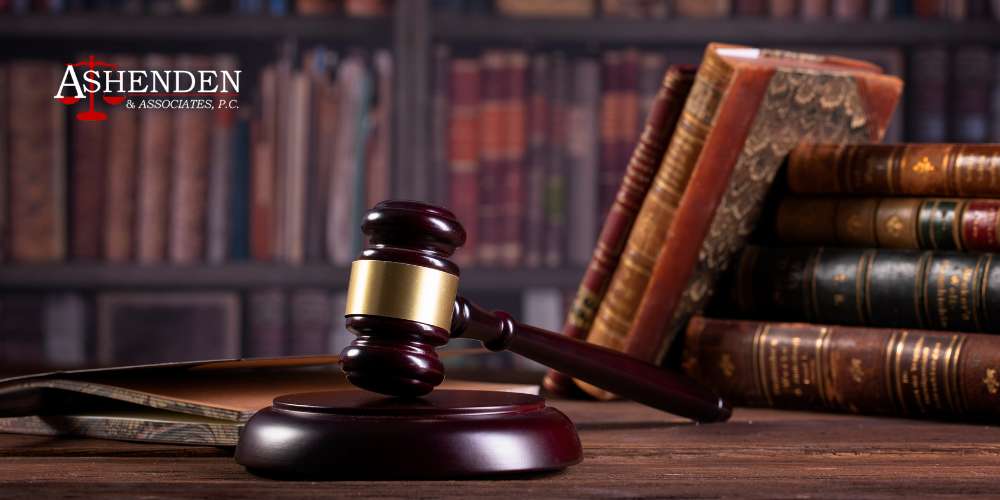The Sandy Springs post-concussion syndrome injury attorneys at Ashenden & Associates understand the complexities of post-concussion syndrome, a condition where concussion symptoms persist long after a mild traumatic brain injury or mild head injury. Persistent postconcussive syndrome can involve a range of prolonged symptoms, such as tension-type headaches, dizziness, blurry vision, trouble falling asleep and engaging in physical activity, post-traumatic stress disorder, memory loss, fatigue, neck pain, and changes in brain function or cerebral blood flow.
For many post-concussion patients, these persistent post-concussive symptoms can impact daily life and require ongoing medical care. If you or a loved one have experienced persistent post-concussive symptoms due to someone else’s negligence, it’s crucial to seek medical care and consult with experienced healthcare providers.
If you have suffered from prolonged symptoms after brain trauma, the Sandy Springs traumatic brain injury attorneys at Ashenden & Associates are here to help. We are committed to providing compassionate support and aggressive representation to victims of negligence and can help you navigate your way towards justice.
Call us at 770-394-8909 to schedule a free consultation with one of our Sandy Springs personal injury attorneys.

What is Post-Concussion Syndrome?
Post-concussion syndrome is a condition that can occur after a person experiences an initial concussion, typically as a result of a minor traumatic brain injury from activities such as sports, car accidents, or falls. While most individuals recover fully from the initial concussion within a few weeks, some may experience persistent symptoms that persist for months or even years after their initial injury.
PCS symptoms can vary widely but often include tension-type headaches, dizziness, fatigue, difficulty concentrating, memory problems, irritability, and sensitivity to light and noise. These post-concussion symptoms can significantly impact a person’s daily life, affecting their ability to work, engage in activities, and maintain relationships.
Post Concussion Syndrome ICD 10
Persistent post-concussive symptoms differ from common concussion-related symptoms primarily in their duration and severity. While most individuals recover from a previous concussion within a relatively short period, with the symptom duration typically lasting two to six weeks, common symptoms of post-concussion syndrome are more severe symptoms and prolonged symptoms compared to concussion-related symptoms.
Normal concussion symptoms, such as headaches, dizziness, and confusion, usually resolve as the head injury heals. However, if you develop PCS, the persistent post-concussive symptoms may linger much longer.
In some cases, the persisting symptoms may worsen over time. Additionally, while concussion symptoms are often more pronounced immediately following a mild head injury and gradually improve, PCS symptoms may develop, with certain activities making symptoms worse for weeks or months after the initial head trauma.
What is the ICD 10 Code for Post-Concussive Syndrome?
Post-concussion syndrome ICD-10 is classified under the ICD-10 (International Classification of Diseases, 10th Revision) code “F07.81.” This code diagnoses and documents post-concussion syndrome in medical records and health insurance claims.
Post-concussion syndrome (PCS) refers to the persistent post-concussive symptoms, such as tension-type headaches, dizziness, fatigue, irritability, sleep problems, and cognitive difficulties, that continue for weeks, months, or longer after the initial concussion or mild traumatic brain injury (TBI).

Common Causes of Concussions
There are many different kinds of accidents that can cause someone to lose consciousness or suffer from a head injury and, potentially, post-concussion syndrome. Below are some of the most common causes of concussions today.
Post Concussion Syndrome Caused by Auto Accidents
Motor vehicle accidents are a common cause of initial concussion injuries. Auto accidents can cause drivers, passengers, and pedestrians to suffer from serious injuries, including traumatic brain injury. The sudden impact of the collision can cause the head to move forcefully and can cause the head to strike hard surfaces, all of which can lead to a head injury.
If you’ve experienced a headache after a car accident, seek medical attention and request a functional MRI (magnetic resonance imaging) to rule out post-concussion syndrome caused by an auto accident.
If you’re in a car accident, should you get a lawyer? Contact our Sandy Springs auto accident attorneys for a free consultation if you’ve experienced prolonged symptoms after a mild head injury.
Car Accidents
Car accidents are a very common cause of concussions. Even minor accidents, such as rear-end collisions or fender benders, can cause enough force to jolt the brain within the skull, which can lead to a brain injury.
Our Sandy Springs car accident lawyers can help secure compensation to help with treatment options for post-concussion syndrome.
Truck Accidents
Trucking accidents can also lead to concussions, as well as other devastating injuries. When a truck collides with a smaller vehicle or object, the force generated from the accident can be immense. This can easily lead to a traumatic brain injury in addition to other injuries.
Our Sandy Springs trucking accident attorneys can inform you of your legal rights if you’re experiencing this brain dysfunction due to someone else’s negligence.
Motorcycle Accidents
Motorcyclists aren’t as well-protected as those in cars and trucks, so when a cyclist is in an accident, they are at high risk of suffering a severe head injury. In Georgia motorcycle accidents, riders are often ejected from their bikes upon impact or collide with other vehicles or objects, often causing head trauma.
Pedestrian Accidents
In a pedestrian accident, the impact of a vehicle hitting the pedestrian can cause their head to forcefully strike the ground, resulting in head trauma and concussion. Even at lower speeds, the sudden stop or change in direction caused by a collision can cause the brain to move within the skull, leading to a brain injury.
Our Sandy Springs pedestrian accident attorneys can help you pursue compensation for ongoing medical attention, cognitive therapy, and other expenses related to post-concussion syndrome.
Post Concussion Syndrome Caused by Work Injuries
Another common cause of concussions is work-related accidents in Georgia, especially for those working in industries with a high risk of falls or collisions.
For example, construction workers may experience concussions from falls off scaffolding or being struck by falling objects. Additionally, workers in manufacturing or industrial settings may sustain brain injuries from machinery accidents or workplace collisions.
Slip and Fall Accidents Causing Post-Concussion Syndrome
Slip and fall accidents are another common cause of concussions, especially among older adults and young children. When individuals slip or trip and fall, they may hit their heads on the ground or other objects, leading to head trauma and concussion.
Our Sandy Springs slip-and-fall accident attorneys help victims recover compensation for injuries caused by uneven surfaces, wet floors, inadequate lighting, and walkway obstacles that can increase the risk of accidents and subsequent head injuries.
Sports-Related Concussion
Sports-related activities, mainly contact sports such as football, soccer, and hockey, can cause someone to suffer a brain injury, often as a result of collisions, falls, or blows to the head. The high speed and physical nature of a sport can increase a player’s risk of suffering from a sport-related concussion.
If your child was injured due to an unmaintained premise, our Sandy Springs child injury lawyers can help your family pursue damages for serious injuries.

Post-Concussion Syndrome Symptoms
Post-concussion syndrome can lead to several symptoms, including sensory, physical, and emotional symptoms. Below are some of the different post-concussion symptoms a person may experience following a mild traumatic brain injury.
Physical Concussion Symptoms
Physical symptoms of post-concussion syndrome can include:
- Tension-type headaches
- Nausea
- Fatigue
- Difficulty balancing
- Difficulty coordinating movement
- Sleep problems
Sensory Concussion Symptoms
Victims of head trauma may also experience sensory-related post-concussion symptoms, such as:
- Dizziness
- Sensitivity to light
- Sensitivity to sound
- Sensitivity to smell
- Seeing stars
- Double vision
- Vertigo
Cognitive and Behavioral Concussion Symptoms
Those with PCS may also experience mental and behavioral symptoms.
Common cognitive symptoms include:
- Short-term memory loss
- Difficulty concentrating
- Difficulty organizing thoughts
- Slow thought processes
Common behavioral symptoms include:
- Irritability
- Impulsivity
- Anxiety
- Mood swings
- Restlessness
Symptoms of Post-Concussion Syndrome Years Later
Unfortunately, symptoms of post-concussion syndrome can persist for months or even years after the initial injury. Years later, individuals with PCS may continue to experience a range of symptoms, including chronic tension-type headaches, dizziness, and fatigue. They may also still experience difficulty concentrating or tolerating sensory stimuli.
These persistent symptoms can also lead to mental disorders like depression and anxiety or can cause pre-existing mental issues to worsen. It’s crucial for individuals experiencing prolonged symptoms of PCS years after a concussion to seek medical care through physical medicine and physical therapy to manage post-concussion symptoms effectively and improve long-term outcomes.
How Long Does Post-Concussion Syndrome Last?
The duration of persistent post-concussive symptoms can vary widely. It can be affected by factors such as the severity of the initial injury, the person’s health characteristics, and the effectiveness of treatment options.
Typically, the acute phase of concussion symptoms, such as tension headaches, dizziness, and cognitive difficulties, resolves within the first few weeks after the initial injury. Those with persistent post-concussive symptoms, however, may experience prolonged symptoms for months or even years.
Complications of Post-Concussion Syndrome
Post-concussion symptoms can have a severe negative impact on a person’s ability to function and their quality of life. Physical symptoms like headaches, nausea, and sleep problems can vary in intensity. For many, physical activity makes symptoms worse, making it challenging for individuals to engage in daily activities and maintain their routines.
Cognitive symptoms can impede brain function, making it harder for individuals to return to daily physical activity after a traumatic brain injury. Concentration issues can lead to executive function, impacting a person’s work, school, and interpersonal relationships.
Behavioral symptoms can also alter a person’s ability to engage with others, making it harder for them to make or maintain their personal relationships. Suffering from these prolonged symptoms can result in serious mental health issues and an overall decrease in a person’s quality of life.
Risk Factors of Post-Concussive Syndrome
While almost anyone can suffer from a concussion, there are certain higher risk factors that can make someone more likely to suffer from post-concussion syndrome. Someone may have a higher risk of suffering from PCS if they:
- Have attention-deficit/hyperactivity disorder (ADHD) or another learning disability
- Have a history of mood disorders or other behavioral conditions
- Have suffered from past concussions or head trauma
- Have suffered from concussion-related complications
- Suffer from a large number of concussion symptoms soon after their injury
- Suffer from more severe concussion symptoms soon after their injury
Post-Concussive Syndrome Treatment
Treatments for PCS aim to alleviate persistent post-concussive symptoms, improve motor and cognitive functioning, and promote overall wellness and recovery. Medical professionals often employ a multidisciplinary approach to treat post-concussion syndrome.
Immediately after a minor head injury, medical professionals will often recommend rest and a gradual return to activities. They’ll also use other symptom management options like pain medications and medications for mood issues like anxiety and depression.
Cognitive therapy may help improve cognitive symptoms like memory, concentration, and executive function. They may also recommend physical therapy to improve balance and coordination issues. Additionally, psychotherapy may be beneficial for addressing emotional and psychological symptoms associated with PCS, such as anxiety and depression.

Post-Concussion Syndrome Test
Post-concussion syndrome is typically diagnosed through a combination of medical history, physical examination, and symptom assessment. Healthcare providers may conduct neurological tests to evaluate cognitive function, balance, and coordination.
They may also use imaging tests such as CT scans or functional MRI (magnetic resonance imaging) scans to rule out other potential causes of persistent symptoms and assess for structural brain injuries. Additionally, neuropsychological testing may assess cognitive symptoms, memory, and other brain functions. These evaluations are used with the patient’s medical history to help definitively diagnose PCS.
What Can a Neurologist Do For Post-Concussion Syndrome?
As experts in the field of neurology, neurologists can help those with post-concussion syndrome manage and mitigate post-concussion symptoms, allowing them to return to normal life as soon as possible. A neurologist can conduct comprehensive evaluations to assess the severity and extent of PCS symptoms using neurological tests, imaging studies, and neuropsychological assessments.
Once diagnosed, they can help treat post-concussion syndrome through physical medicine. Neurologists can also coordinate multidisciplinary care with other healthcare professionals to coordinate cognitive therapy with physical therapy and counseling.
These can help individuals manage PCS symptoms, improve overall functioning, and increase their quality of life.
Treatment for Post-Traumatic Stress Disorder, Mental Illness, and Behavioral Issues
Treatment options for mental health issues associated with post-concussion symptoms typically involve a combination of psychotherapy, medication management, and supportive interventions.
Psychotherapy, such as cognitive-behavioral therapy (CBT), can help individuals cope with symptoms of anxiety, depression, and other emotional symptoms by providing strategies to address negative thought patterns.
Medications such as antidepressants or anti-anxiety medications may be prescribed to alleviate symptoms and stabilize mood. Additionally, supportive interventions, like patient education, lifestyle modifications, and social support networks, can also play a crucial role in managing mental health issues related to PCS.

Can Post-Concussion Syndrome Be Permanent?
While most post-concussion symptoms fade away over time, in rare instances, post-concussion syndrome can be permanent. However, with appropriate care, support, and rehabilitation, those with persistent post-concussion syndrome can experience significant improvement in persistent symptoms and their overall well-being. This can allow them to better manage and cope with the conditions’ associated challenges and move forward with their life.
Living With Post-Concussion Syndrome
Living with post-concussive syndrome (PCS) can be challenging and unpredictable. Individuals with PCS may experience a range of persistent symptoms and experience a decrease in their quality of life.
Coping with PCS often requires patience, resilience, and a supportive network of healthcare professionals, family, and friends to navigate the physical, cognitive, and emotional challenges associated with the condition. If you’re experiencing symptoms of PCS, it’s important to reach out to medical professionals regarding your symptoms to ensure you receive the support you need for however long you need it.
Can You Sue for a Mild Traumatic Brain Injury?
Yes, in certain situations, you may be able to sue over a mild traumatic brain injury. If your injury was the result of someone else’s negligence, and you suffered from various losses as a result of the injury, you may have grounds for a personal injury lawsuit.
While mild TBIs, such as concussions, may not always result in visible physical damage, they can still have significant consequences, including cognitive impairments, emotional disturbances, and long-term health issues. If your mild TBI was caused by the negligence or wrongdoing of another party, you deserve justice.
A Sandy Springs personal injury lawyer can evaluate your situation and determine your eligibility for a lawsuit. From there, they can help you understand your rights, the potential value of your claim, and what you should do next.
How to Prove Negligence in a TBI Claim
To receive compensation for a traumatic brain injury, the victim (the plaintiff) must be able to prove that their injury was the result of the negligence of another person (the defendant). This is done by establishing the four key elements of negligence: duty of care, breach of duty, causation, and damages. The plaintiff must be able to prove:
- Duty of care: the defendant had a responsibility to act cautiously around others
- Breach of duty: the defendant failed to uphold their duty of care
- Causation: the defendant’s breach of duty caused the victim’s injuries
- Damages: the victim suffered from financial and non-financial losses as a result of their injuries
Proving negligence in a TBI claim often requires gathering relevant evidence, such as medical records, eyewitness testimony, accident reports, and expert opinions, to support the plaintiff’s case. and establish liability on the defendant’s part.
If you have suffered from a traumatic brain injury, it’s essential to consult with an experienced personal injury attorney regarding your case. They can provide valuable guidance and assistance in navigating the legal system.

Damages for Head Injury Victims
If you have suffered from a mild traumatic brain injury, you may be able to recover compensation for losses such as:
- Past and future medical expenses
- Past and future rehabilitative costs
- Lost wages
- Loss of earning capacity
- Loss of quality of life
- Physical pain and suffering
- Emotional distress
Post-Concussion Syndrome Settlement Value
All accident cases are unique, and PCS cases are no exception. The settlement value of a post-concussion syndrome case can be influenced by various factors, including:
- The severity and duration of the symptoms
- The impact of the injury on the individual’s daily life and ability to work
- The extent of medical treatment required
- The patient’s prognosis for recovery
Factors like the strength of the evidence supporting the claim, the jurisdiction in which the case is filed, and the skill and experience of the victim’s legal team can also affect the settlement value.
If you have suffered from persisting symptoms after a traumatic brain injury, and the injury was the result of someone else’s negligence, contact a local personal injury attorney. They can help determine the value of your case and provide you with the guidance and legal support you need to achieve the best possible outcome.

Sandy Springs Traumatic Brain Injury Attorneys
If you or a loved one have experienced a traumatic head injury in Sandy Springs or the greater Atlanta area, contact the skilled injury attorneys at Ashenden & Associates, P.C. today. We understand how debilitating head injuries can be, especially when your symptoms persist longer than they should.
Whether your head injury resulted from a car accident, slip and fall incident, workplace accident, or another traumatic event, we are here to provide you with the personalized attention and aggressive representation you need to seek justice.
Call us at 770-394-8909 or contact us online to schedule a free consultation with a member of our team.

